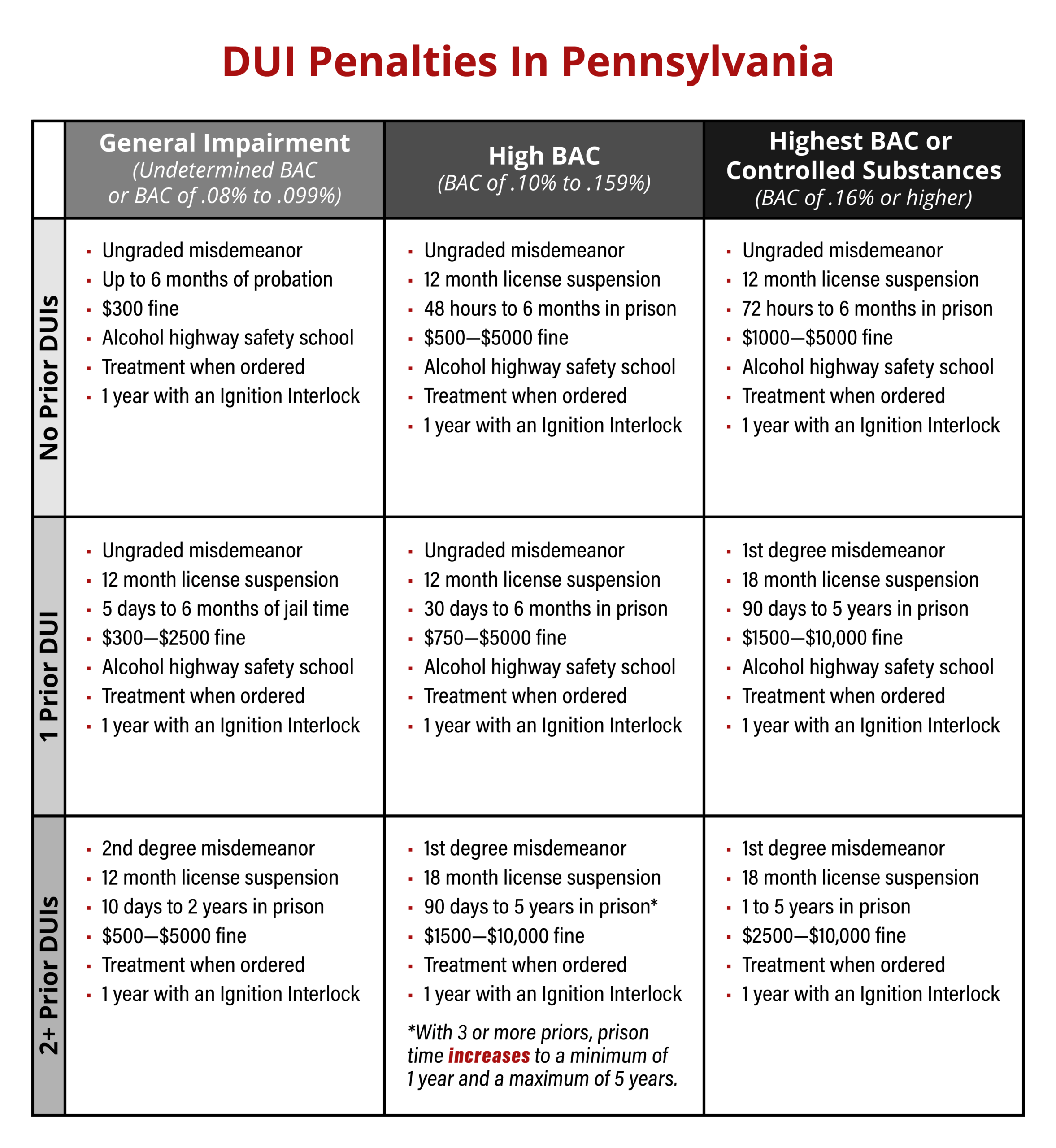
DUI Charges in Pennsylvania
Driving under the influence, or DUI, is a criminal charge issued when a person is found to be operating a vehicle while under the influence of alcohol or a controlled substance. The person charged with a DUI must be sufficiently impaired and incapable of safely operating the vehicle. In simpler terms, if you cannot safely drive a vehicle because of the presence of alcohol or drugs in your system, you have committed a DUI.
Pennsylvania law takes this a step further. Even if you are capable of safely driving, your blood alcohol content cannot be above a certain level. The higher the blood alcohol content, the more serious the charges will be.
Blood Alcohol Content (BAC) Levels
Under Pennsylvania law, you cannot have a blood alcohol content (BAC) level of .08% or higher and operate a vehicle. The consequences for a DUI will vary depending on how high your BAC is and how many prior DUIs you’ve had. There are three levels of DUI. The first is called General Impairment, and this applies when your BAC is between .08% and .099%. The next level is called High BAC—this is when you’re BAC is between .10% and .159%. The final level is Highest BAC, when your BAC is .16% or higher. Below is a chart with information from the Pennsylvania Department of Motor Vehicles explaining the variety of consequences you may face when charged with a DUI.

What is considered a vehicle?
This may seem like a silly question, but Pennsylvania law defines vehicles differently than you may think. Under 75 Pa.C.S.A. § 102, vehicles are defined as “[e]very device in, upon or by which any person or property is or may be transported or drawn upon a highway, except devices used exclusively upon rails or tracks.” While this includes cars, trucks, and other motor vehicles, the law’s definition of a vehicle also includes things like bicycles, all-terrain vehicles, snowmobiles, and dune buggies.
What do I do about my DUI?
DUIs come with a variety of penalties, as seen in the chart above, and they will stay on your criminal record unless you are able to have them expunged. Outside of the more obvious penalties directly related to the DUI, like license suspensions, fines, and traffic safety school requirements, criminal records can impact your life. They may make it difficult to apply for certain types of jobs, housing, and insurance, among other potential issues. It’s important to address a DUI properly if you are charged with one.
Every link in the chain of prosecution must hold strong in order to produce a conviction. The police must obtain the evidence to be used against you in a lawful manner, consistent with the requirements of the Constitution. The prosecutor must be prepared to prove to a magisterial district judge that the police had probable cause to arrest you. Finally, the prosecutor must prove all “elements” of the crime beyond all reasonable doubt before a jury of your peers.
Police Must Obtain Evidence Lawfully
The Bill of Rights provides robust protections against police intruding into your life, but these protections are not absolute. Generally, an officer must have a reason to pull your car over in the first place—he must have a reasonable suspicion to believe that a crime was in progress or had just been committed. These reasons can be fairly simple—maybe you forgot to use a blinker while turning (yes, that’s illegal), had a taillight out, or most tellingly, you were swerving around on the road or driving erratically in such a way that suggested impaired driving.
Once the officer pulls you over (assuming he did so legally), he will need to justify each further intrusion into your privacy. If the officer is relying on the result of a blood test performed on you, he will have to deal with the dictates of the Supreme Court’s ruling in Birchfield.
All of these protections sound powerful, and they are. But it’s important to remember that much of this will come down to an officer’s word vs. yours. Whether just or not, judges and juries give a lot of credence to what a police officer has to say about an encounter.
Preliminary Hearing
You have a right to a preliminary hearing at the Magisterial District Court. This step is important for your attorney in preparing certain pretrial motions, as well as for assessing the strength of the case against you. You will not be convicted at preliminary hearing, and in most cases, the charges won’t be dismissed there, either. It’s a first step in a longer process.
Omnibus Pretrial Motion
One of the most powerful tools in your attorney’s tool belt is the omnibus pretrial motion. This motion allows the attorney to challenge the evidence against you, and to challenge the officer’s “probable cause” to arrest and charge you in the first place. This is an opportunity to have the charges dismissed completely. If the officer failed to collect the evidence against you in a lawful way, this is the time to challenge that. Your attorney will file a motion—a written document, filed with the court—laying out in detail the problems with the case against you, and will then attempt to prove those points in a hearing that follows.
What About ARD?
Accelerated Rehabilitative Disposition is a program available to first-time, non-violent offenders, including most first-time DUIs. Upon successful completion of this program, your record is expunged, which makes ARD the most generous opportunity available to you as a defendant.
